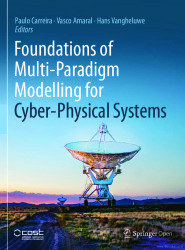Foundations of Multi-Paradigm Modelling for Cyber-Physical Systems
Table of contents
| Pages : | 298 |
| Size : | 10.0 MB |
| File type : | |
| Downloads: | 76 |
| Created: | 2022-02-02 |
| License: | CC BY |
| Author(s): | Paulo Carreira, Vasco Amaral, Hans Vangheluwe |

Warning: Trying to access array offset on false in /home/tutovnfz/public_html/article.php on line 233
Others model Tutorials
Cyber-Physical Systems: A Model-Based Approach
Regression Models for Data Science in R
High-Performance Modelling and Simulation for Big Data Applications
Business Models for the Data Economy
Think Complexity: Complexity Science and Computational Modeling, 2nd Edition
Others related eBooks about Foundations of Multi-Paradigm Modelling for Cyber-Physical Systems
Business Models for the Data EconomyDownload free course Business Models for the Data Economy, pdf file on 21 pages by by Q Ethan McCallum, Ken Gleason....
Cloud-Based Benchmarking of Medical Image AnalysisDownload free course Cloud-Based Benchmarking of Medical Image Analysis, pdf file on 256 pages by Allan Hanbury, Henning Müller, Georg Langs....
Introduction to the Unified Modeling LanguageThis pdf tutorial aims to teach you all the notions of the UML language so that you can easily model your data and processes with the standard UML 2.0....
The Data Science Design ManualDownload free course The Data Science Design Manual, pdf file on 456 pages by Steven S. Skiena....
Cloud Design PatternsDownload free course Cloud Design Patterns, pdf file on 236 pages by Alex Homer, John Sharp, Larry Brader, Masashi Narumoto, Trent Swanson....
Regression Models for Data Science in RDownload free course Regression Models for Data Science in R, pdf file on 144 pages by Brian Caffo....
Physical Modeling in MATLABDownload free course Physical Modeling in MATLAB, pdf file on 169 pages by Allen Downey....
Cyber-Physical Systems: A Model-Based ApproachDownload free course Cyber-Physical Systems: A Model-Based Approach, pdf file on 205 pages by Walid M. Taha, Abd-Elhamid M. Taha, Johan Thunberg....
Model-Based Engineering of Collaborative Embedded SystemsDownload free course Model-Based Engineering of Collaborative Embedded Systems, pdf file on 411 pages by Wolfgang Böhm, Manfred Broy, Cornel Klein, Klaus Pohl, Bernhard Rumpe, Sebastian Schröck....
Getting started with Design patternsDownload free Design patterns tutorial course in PDF, training file in 32 chapters and 144 pages. Free unaffiliated ebook created from Stack OverFlow contributor....